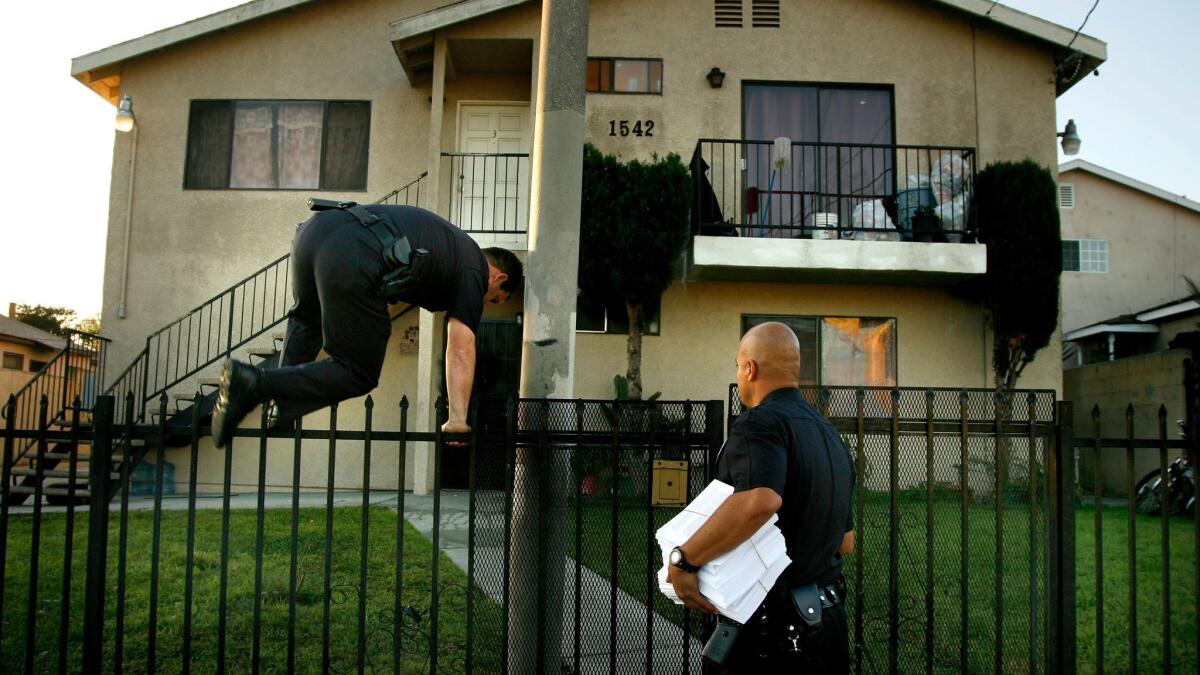Judge halts L.A. gang injunction against an Echo Park man who denies being in a gang

- Share via
A federal judge on Thursday temporarily barred Los Angeles police and prosecutors from enforcing a gang injunction against an Echo Park man, saying she believed he would likely prove his rights were violated when he was swept up in the order.
The 29-page order stems from a lawsuit filed by the American Civil Liberties Union and other groups last year. The suit accuses police of violating Peter Arellano’s due process rights — and those of thousands of other people — by serving them with gang injunctions without allowing them to first contest the orders in court.
Arellano, who denies being in a gang, “is likely to establish that the city did not provide him with due process in enforcing the injunction against him,” Chief U.S. District Judge Virginia A. Phillips wrote. “Continued enforcement of the injunction is likely to result in irreparable injury.”
The case is still winding its way through court. But Peter Bibring, a senior staff attorney with the ACLU of Southern California, said he believed the judge’s decision was a promising signal of how it could ultimately be resolved.
“We don’t see any reason the court will change its views,” he said. “We’re really hopeful that the city is going to recognize that the way it uses injunctions is unconstitutional and will either radically rework the way they use injunctions or abandon them altogether.”
A spokesman for the city attorney’s office said Thursday that officials there were “reviewing the judge’s decision and our options.”
In an earlier interview, Arellano said he has never been involved with a gang, but that he and his father were both served with injunctions aimed at curbing the activities of six street gangs in 2013. As a result of the court order, Arellano said he can’t even go out to dinner with relatives without risking arrest.
The injunctions, used by the city since the late 1980s, are civil court orders that bar suspected gang members from engaging in certain activities in areas where the gang is known to congregate. People subject to injunctions are generally prohibited from wearing clothing that police believe highlights gang affiliation within the designated areas and from socializing with other alleged gang members in public, including family members.
Those who violate injunctions can be charged with contempt and face up to six months in jail.
In its lawsuit, the ACLU criticized the methods by which the city obtains them and what it called a “painstakingly slow” relief process for those who think they have been wrongfully labeled as gang members. City officials usually name a gang faction, rather than individual gang members, when seeking an injunction, according to the suit. That creates a situation where the city typically obtains the injunction during an uncontested court proceeding, the ACLU said.
There are signs, however, that the process might change.
In a court filing this summer, Deputy City Atty. Patricia Ursea acknowledged the city is planning to alter its policies. People subject to injunctions will have at least 30 days to challenge them in state court or through a separate removal process set up by the city before the orders become enforceable, according to the filing.
The city is also going to revise its criteria for removing people from injunctions, which had come under sharp criticism from the ACLU and other activists, and has considered releasing an undisclosed number of people from current injunctions, according to the filing.
More to Read
Sign up for Essential California
The most important California stories and recommendations in your inbox every morning.
You may occasionally receive promotional content from the Los Angeles Times.












